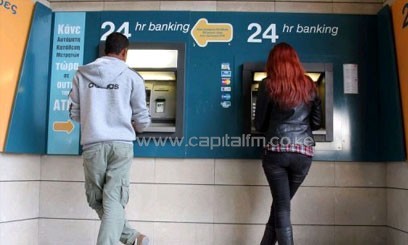
A man and a woman withdraw money from a cash-point machine in the Cypriot capital Nicosia on March 16, 2013/AFP
Fellow eurozone countries and international creditors imposed the deeply unpopular levy of up to 9.9 percent on all deposits in the island’s banks as a condition for a desperately needed 10-billion-euro ($13 billion) bailout.
Conservative President Nicos Anastasiades needs to get the legislation ratifying the deal through parliament before banks reopen or face a run on accounts.
But Cyprus media reported that the scale of revolt against the agreement among MPs has thrown into disarray his efforts to do so over a three-day holiday weekend, and he may have to declare an additional bank holiday on Tuesday.
Negotiations are under way with the central bank to keep branches closed for an extra day, despite the potential economic cost, the privately run Sigma TV reported.
Anastasiades is struggling to secure even a simple majority for the terms of the bailout in the 56-member parliament in which his conservative DISY parliament holds just 20 seats, the channel said.
State television said the government had decided to postpone the debate to “ensure MPs were fully aware of the situation and were better informed.”
The president also postponed until Monday a planned address to the nation to defend the “painful” sacrifices which he insisted were the only way to save the island’s banking sector from total collapse.
MPs will now convene at 4:00 pm (1400 GMT) on Monday to debate ratification after a briefing by the conservative president at 11:00 am (0900 GMT), the state broadcaster said.
The debt rescue package, agreed with the eurozone and International Monetary Fund early on Saturday after around 10 hours of talks in Brussels, is significantly less than the 17 billion euros Cyprus had initially sought.
Most of the balance is to be made up through the bank deposit levy — the first eurozone bailout in which private depositors are having to help foot the bill.
Savers in Cyprus banks reacted with shock and anger after Anastasiades agreed to the levy in an 11th-hour U-turn on months of promises that such a measure was a red line it would never cross.
“This is like stealing, I feel rage,” a Nicosia artist who gave his name only as Kyriakos told AFP.
Opposition politician George Lillikas called on his supporters to protest on Tuesday, charging that the president, who was elected only last month, had “betrayed the people’s vote.”
Ministers will now meet at 8:30 am on Monday to thrash out the draft legislation to put before parliament, state media said.
Europhile former president George Vassiliou pleaded with MPs to accept an agreement that he said was the only one acceptable to the parliaments of EU creditor nations like Germany.
“The Germans told us they couldn’t pass a Cyprus bailout through the Bundestag without a haircut on bank deposits,” Vassiliou told state television from Berlin.
“Reducing bank savings is an unjust measure but the economy is saved and we stay in the euro.
“If this bill isn’t approved, there will be a run on the banks and they will collapse. I don’t think the banks will open if the bill isn’t passed.”
But Vassilou’s centre-left United Democrats has no seats in the current parliament, in which most parties have serious misgivings about the deal.
The communist AKEL party, which has 19 seats, had refused to sign an agreement on the terms on offer while it was in power before Anastasiades’s election last month.
Even the president’s coalition partners had strong words against the deal. DIKO leader Marios Garoyian said he had spoken to Anastasiades about seeking “alternative choices” amid opposition from some of his centrist party’s nine MPs.
But German political analyst Hubert Faustmann said that ultimately MPs had little choice but to accept the deal.
“Parliament will have to vote it through because the alternative is bankruptcy. They cannot amend it, as far as I know, it is a ‘yes’ or ‘no’ vote — and a ‘no’ means bankruptcy.”


































